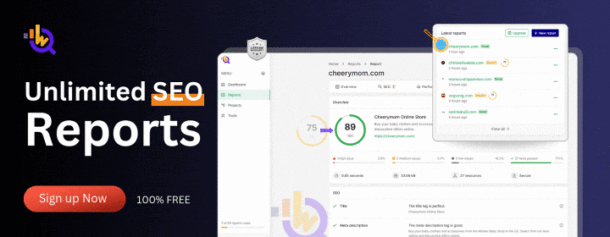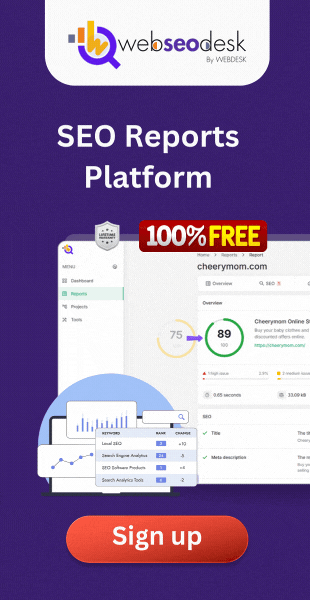Driving natural traffic and raising online exposure in the realm of digital marketing depend critically on SEO, or search engine optimization. But without enough research and tracking, SEO initiatives like sailing a ship without a compass. Analytics comes in handy here. To make sure you’re headed in the correct direction, analytics tools help assess, evaluate, and measure your SEO initiatives. This post will go over why analytics is crucial for your SEO plan and how it may drastically affect the performance of your website.
- Interpreting User Behavior
Analytics is essential for SEO mostly because it offers understanding of user interaction with your website. Google Analytics among other tools lets you monitor user behavior on your website including page visits, length of stay, and exit points. Finding which pages require work and which materials appeal to your readers depends on this knowledge.
Examining user behavior will help you to make data-driven decisions to maximize your user experience and content. If visitors are quickly departing a given page, for instance, it could mean that the page has high bounce rates or that the material is not appealing. Analytics allows you to identify these problems and apply fixes meant to increase user involvement and enhance search engine optimization.
Two: Monitoring Keyword Performance
The basis of SEO is keywords, hence tracking their effectiveness will help you to maximize your content strategy. Analytics tools enable you to see which keywords rank on search engines and which are bringing visitors to your website. Monitoring keyword performance helps you to spot low-performance keywords that need work as well as very successful ones that draw visitors.
Google Search Console among other SEO tools lets you monitor the natural search performance of your website including keyword ranks, impressions, clicks, and click-through rates (CTR). Whether your SEO plan calls for targeting new keywords, improving underperforming material, or changing your general keyword use, this information is priceless since it helps you hone your approach.
- Calculating Natural Traffic
A vital sign of SEO performance is organic traffic. Analytics solutions offer insightful information on the volume of natural traffic your website gets as well as the channels most responsible for that traffic. Tracking organic traffic over time helps you evaluate how well your SEO efforts are working and make required changes to raise performance.
If you observe a drop in organic traffic, for example, analytics can help you pinpoint possible causes such changes in search engine algorithms, keyword ranks, or website content. Knowing these patterns helps you to act early to get traffic and guarantee steady increase.
- Noting Technical SEO Problems
Technical SEO is absolutely crucial for how search engines scan and index your website; SEO is not only about keywords and content. Technical problems that might compromise your SEO performance—such as slow page loads, broken links, or duplicate content—may be found with analytics tools. Tracking site performance, for instance, made possible by Google Analytics, significantly affects user experience and rankings.
Using analytics to identify and resolve technical SEO problems will help your site to be more crawlable, speed up page loads, and improve user experience. Better search engine results and more natural traffic are two outcomes of these developments.
Monitoring Conversion Rates and Return on Investment
SEO aims not only for increasing traffic but also for turning that traffic into leads or sales. Analytics tools let you monitor conversion rates and assess your SEO’s return on investment (ROI). Setting up conversion objectives in Google Analytics will help you track lead generation, purchase behavior, or other desired behaviors on your website.
Understanding whether your SEO plan is producing real-world commercial results depends on knowing this information. If your traffic is rising but your conversions are poor, it could mean problems with calls to action, landing page SEO, or user experience of your website. Analytics can offer the knowledge required to solve problems and raise your conversion rates.
- Competitive Interpretive Study
Apart from monitoring the success of your own website, analytics tools can help provide understanding of the SEO initiatives of your rivals. Knowing your rivals’ organic traffic, keyword results, and backlink performance will help you to develop your SEO plan with a competitive edge.
Analyzing your rivals’ best-performing pages, backlink profile, and keyword ranking for utilizing tools like SEMrush, Ahrefs, or Moz helps you This information lets you find chances for improvement and expose holes in your own SEO plan. If a rival is ranking strongly for a keyword you have not targeted, for example, you might modify your approach to incorporate that keyword and challenge for a better ranking.
- Evaluating Content Effectiveness
SEO depends mostly on content; thus, evaluating how your material performs can help you to change your approach. Tools for analytics show which blog entries, stories, or pages draw the most traffic, interaction, and conversions. This data clarifies which subjects are most popular and which materials your readers will find relevant.
Finding your best-performing material can help you concentrate on producing like-minded material to keep increasing traffic and interaction. On the other hand, poorly performing material can be improved or changed to better suit your audience.
- Maintaining Currency with Algorithmic Changes
Frequent algorithm changes by search engines such as Google could affect your SEO results. Maintaining a successful SEO strategy depends on you tracking these changes and examining how they impact the performance of your website. Analytics lets you track changes in traffic and rankings and ascertain whether an algorithm update has affected your website.
For instance, you might use analytics data to identify the reason for a decline in traffic or keyword results following a Google update and modify your SEO plan. Using analytics to adjust to changes in algorithms and keeping current with them guarantees that your SEO initiatives stay successful.
Finally,
SEO in the competitive digital scene of today calls for more than simply technical know-how and keyword searches. Understanding the effectiveness of your SEO initiatives, spotting opportunities for development, and basing data-driven decisions on analytics will help you to maximize your approach. Using analytics will help you to keep ahead of your rivals, track user behavior, monitor keyword performance, spot technological problems, and measure return on investment.
Including analytics into your search engine optimization not only makes sense but also is very necessary for long-term success. Using the correct tools and knowledge can help you to always improve and maximize your SEO plan so that your website ranks higher, draws more visitors, and generates conversions.












0 Comments